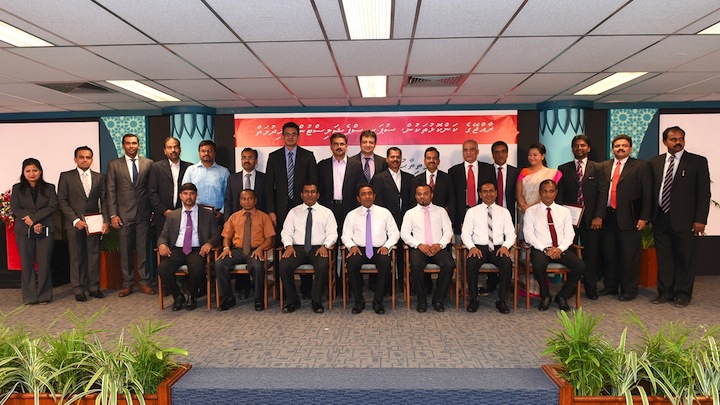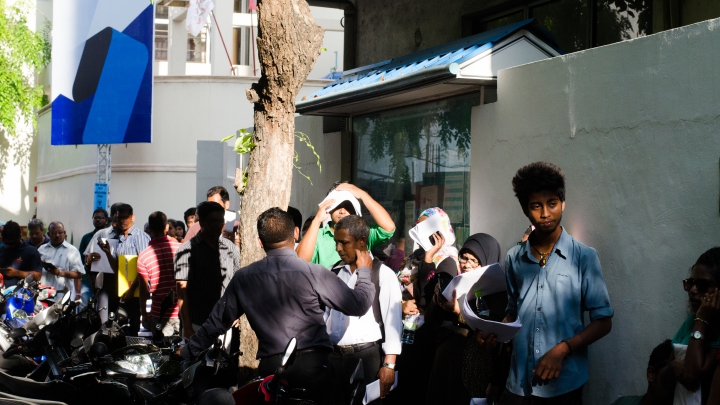President Abdulla Yameen last night inaugurated the ‘Unlimited Aasandha’ universal health scheme, a presidential campaign pledge and part of his first hundred day programme.
Criticising the Aasandha service introduced by President Nasheed, Yameen said the new Aasandha will have no limit on the amount of money that can be spent or with regards to age categories.
“Today the state of Aasandha is that every one has one lakh rufiyaa limit. Without any regard to the illness the person has, how much has to be spent, it is over for them when the one lakh limit is reached,” Yameen said.
Yameen stated that the new scheme will be “sustainable and funded by the state budget”. Cabinet Minister Ahmed Adeeb has suggested that ‘Unlimited Aasandha’ and other enhanced social services will be financed through long term government bonds.
President Yameen noted that the following will be covered by the new ‘Unlimited Aasandha’ scheme;
- Sports injuries – including surgical procedures and rehabilitation treatment for professional athletes
- All accidents and emergencies that happen while abroad
- Emergency transfer of patients from islands
- Transportation tickets for medical escorts to travel abroad with patients under 18 and above 65 years
- Organ transplants and any permanent medication that is required after such a surgery
- Unlimited coverage for pregnant women
- Free annual medical checkups for every citizen above 30 years of age, and for school children
Though persons with special needs are not exempted, their temporary, permanent, and physical aids will not be covered through the service, said Yameen. The president pledged to find a solution to this problem during the next Majlis.
As the ‘old’ Aasandha was reportedly abused by members of the public and even health care providers and pharmacies, Yameen urged all to use the service “in good faith”.
“This is a service that is spent from people’s money for all citizens. So everyone should use it responsibly”.
The new unlimited service is an upgrade from the existing Aasandha programme introduced by President Mohamed Nasheed which encountered a number of issues, particularly with regards to sustainability.
After reaching the brink of financial collapse in August 2012, small charges were introduced to the scheme at private clinics. The opposition Maldivian Democratic Party (MDP) suggested that Yameen’s Progressive Party of Maldives and the coalition alliance had deliberately sabotaged the service.
Financing the pledges
The government has also made assurances that it can fulfill its pledges to increase old age benefits and to pay fishermen an allowance of MVR10,000.
The MVR2,000 pension for individuals over 65 years of age was increased to MVR2,300 through an amendment to pension legislation, while President Yameen has pledged to further increase it to MVR5000 starting from 1 March 2014.
The pledge to pay MVR10,000 to every fisherman regardless with or without any catch had later been explained by the Minister of Fisheries and Agriculture as an insurance scheme whereby fishermen would pay a monthly premium of MVR500 (US$32) during the fishing season to gain MVR10,000 (US$ 650) during the off-season.
On Sunday, however, President Yameen said the insurance scheme for the fisheries and agriculture sector was just one of the pledges to have been achieved within the first 100 days and that the MVR10,000 allowance would be provided for fisherman as promised starting next month.
The government will need to generate MVR1 billion (US$64.9 million) from investments this year to sustain the pension increase alone.
“The economic committee [a cabinet sub-committee] decided to utilise a long term finance instrument based on a long term bond and t-bills through seven to five years,” Minister of Tourism Ahmed Adeeb said at a President’s Office press conference yesterday.
Assuring that the model was capable of financing the increases, Adeeb said that funds could be increased through legislative changes, and suggested that the Maldives could combine various funds – such as housing fund, health insurance, and pensions – into a single fund.
“If you look at countries like Singapore, all these funds are the contained in a single fund,” he said, stating that as a small country it is a good financial model for the Maldives to create a single strong fund.
Budget deficit
Commenting on Adeeb’s proposals, Mahmud Razee – former economic development minister under Mohamed Nasheed’s administration – said that both T-Bills and bonds, even if it they long term, will increase the national debt.
“These are loans, and taking loans is acceptable to invest in to increasing productivity. But this is not such an investment, this is something the government is spending. Eventually people will have to bear the burden of this,” Razee said.
Referring to the proposal to combine funds, Razee said that if the government was serious about it they should establish the necessary legal mechanisms for such a system.
“When we talk about Singapore, we should know that they can do it because they have that level of savings. But that is not the case with us,” he said.
The money in the pension fund has been entrusted with the state by people who want pensions, and it should not be mixed with other funds, Razee argued.
Selling treasury bills and treasury bonds has been one of the main approaches the government has taken to finance the budget deficit over the past few years.
Last December, the central bank and regulator – the Maldives Monetary Authority (MMA) – advised the state to pay all due treasury bills and treasury bonds and to turn existing short-term debts into long-term ones.
In a 2013 report which described the Maldives as “spending beyond its means”, the World Bank noted that the government had spent over MVR900 million on Aasandha from a budget of just MVR720 million.
Suggestions regarding Aasandha include decreasing the cost of drugs predominantly used by the poorest segments of the population, limiting spending for overseas treatment, moving toward a more close-ended provider payment system, and targeting subsidies only at needier patients.
This year’s record MVR17.95 billion (US$ 1.6 billion) budget has a deficit of MVR1.3 billion (US$84.3 million). The People’s Majlis recently approved a number of revenue-raising measures, while the government has announced it is aiming to reduce expenditure and achieve a balanced budget within a year.
Likes (2)Dislikes
(2)Dislikes (0)
(0)  Speaking at the inauguration ceremony of the super specialist programme last week, NSPA CEO Mujthabaa Jaleel said 22 hospitals from India and Sri Lanka will participate in providing doctors.
Speaking at the inauguration ceremony of the super specialist programme last week, NSPA CEO Mujthabaa Jaleel said 22 hospitals from India and Sri Lanka will participate in providing doctors.

